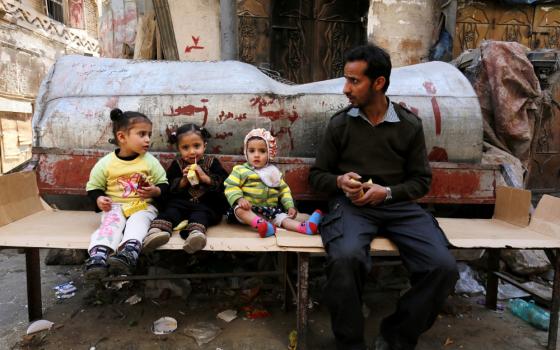Yemen — which has suffered for decades as the poorest country in the Arab world, compounded by frequent armed conflicts — is now even worse off.
Aid officials have long been begging for help in relieving the suffering in Yemen, but a civil war between an Arab coalition led by Saudi Arabia and Houthi rebels from the north has greatly exacerbated the situation by destroying infrastructure and bombing civilian targets, and it's made getting aid to Yemen difficult at best and sometimes impossible.
Now, because of cholera, the New York Times reports that United Nations officials have named Yemen the world's largest humanitarian crisis, with more than 10 million people who need help immediately, including nearly 80 percent of the nation's children.
Cholera is ancient history in most modern countries; but in areas where water is contaminated by sewage, it spreads like wildfire. When cholera does strike, it's usually easy to treat.
But Yemen, the Times reports, is a failed state.
A crucial seaport, bridges, hospitals, sewage facilities and civilian factories have all been damaged or destroyed. What's left of the government is in exile, as rebels have held the capital since 2014. Doctors, nurses and other civil servants haven't been paid in more than a year. All of this has created a fertile environment for cholera.
The result?
In May, June and July, 400,000 cases of suspected cholera have been reported, and nearly 1,900 people have died from it, the U.N. report said. And because of malnutrition — the country is on the brink of outright famine, and nearly 2 million children are acutely malnourished — meaning an infection that should be easily treatable is instead a life-threatening crisis.
"With the malnutrition we have among children, if they get diarrhea, they are not going to get better," Meritxell Relano, the United Nations Children's Fund representative in Yemen, told the Times.
The country, the newspaper reports, is dying a slow death.
Saudi Arabia and the United States are among the biggest contributors to relief efforts. But Saudi Arabia is also leading the coalition fighting the rebels, a coalition that has repeatedly been blamed for killing civilians. The Saudis blame the rebels, but regardless of who's to blame, the war has killed at least 10,000 people and displaced 2 million from their homes. And the United States is the primary supplier of the weapons of war used by the coalition.
Remembering Mississippi
In Milwaukee last week, the School Sisters of Saint Francis held a prayer service in memory of Sr. Margaret Held, who, along Sister of Charity of Nazareth Paula Merrill, was killed a year ago in rural Mississippi.
The service for Held was closed out with a 2003 prayer by Rabbi Harold Kushner called "A Prayer for the World," which — given their tragic deaths and recent events in the U.S. — seems more pertinent and poignant than ever:
Let the rain come and wash away
the ancient grudges, the bitter hatreds
held and nurtured over generations.
Let the rain wash away the memory
of the hurt, the neglect.
Then let the sun come out and
fill the sky with rainbows.
Let the warmth of the sun heal us
wherever we are broken.
Let it burn away the fog so that
we can see each other clearly.
So that we can see beyond labels,
beyond accents, gender or skin color.
Let the warmth and brightness
of the sun melt our selfishness.
So that we can share the joys and
feel the sorrows of our neighbors.
And let the light of the sun
be so strong that we will see all
people as our neighbors.
Let the earth, nourished by rain,
bring forth flowers
to surround us with beauty.
And let the mountains teach our hearts
to reach upward to heaven.
In Nazareth, Kentucky, the Sisters of Charity held a Mass in Merrill's honor, where former provincial Sr. Adeline Fehribach closed out her reflection, on the Old Testament reading about Naomi and Ruth, this way:
May we all strive to replicate the power of gentleness, the boldness in stance and steps for justice and peace, and the relational commitment to God and others that were reflected in the lives of Ruth and Naomi, and Paula and Margaret. May we befriend the echo of an ache that resides within and simply say, "Thank you, God, for these lives well lived."
Over the years I've learned that comfort rarely arrives in the way we expect. But it does arrive. And sometimes it arrives only when we forget about our own pain and focus on how we can heal others.
Remember, links, tips and accounts of the response to any crisis anywhere in the world are always welcome at dstockman@ncronline.org.
[Dan Stockman is national correspondent for Global Sisters Report. Follow him on Twitter @DanStockman or on Facebook.]

